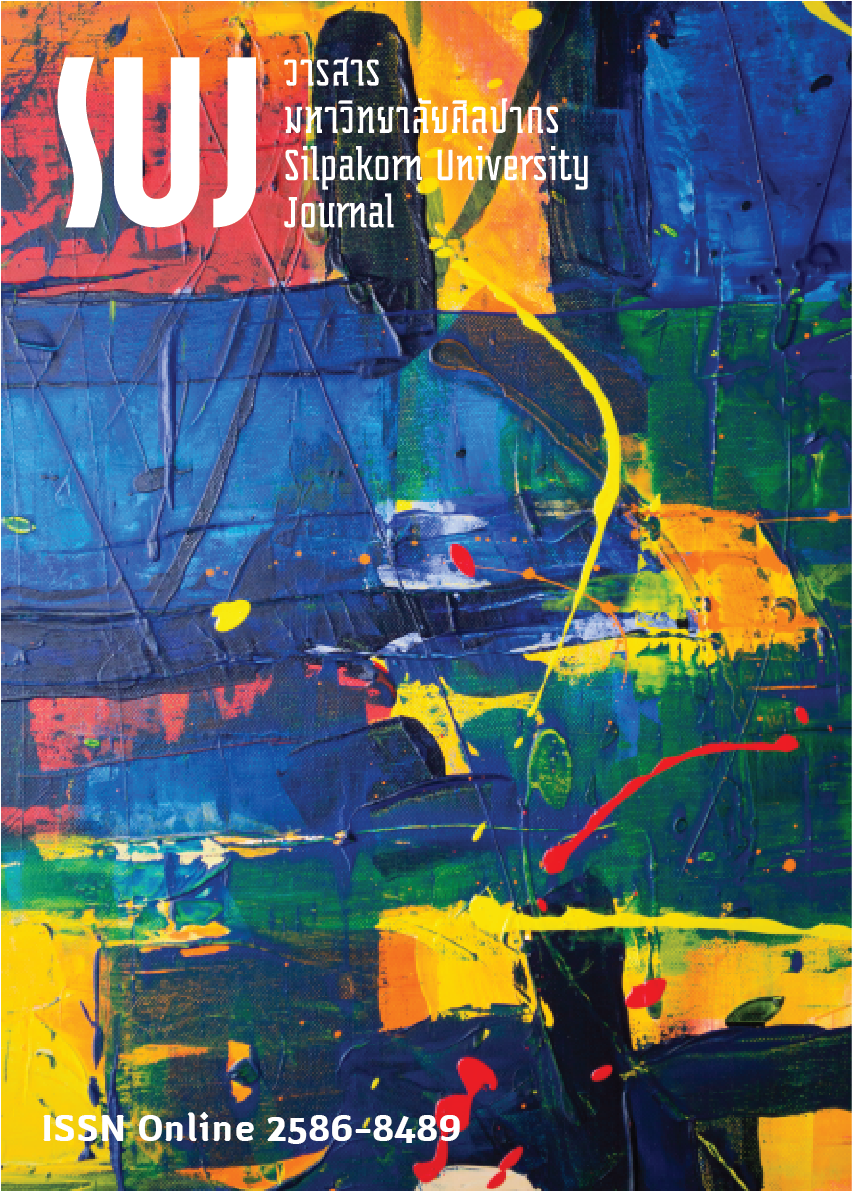การจัดการเรียนรู้โดยใช้โครงการเป็นฐาน (Project based learning)
Main Article Content
Abstract
งานวิจัยเรื่องการจัดการเรียนรู้โดยใช้โครงการเป็นฐานในรายวิชาสื่อพื้นบ้านเพื่อการสื่อสาร มีวัตถุประสงค์ ได้แก่ 1) เพื่อศึกษากระบวนการจัดการเรียนรู้โดยใช้โครงการเป็นฐานในรายวิชาสื่อพื้นบ้านเพื่อ การสื่อสาร 2) เพื่อพัฒนาผลสัมฤทธิ์ทางการเรียนของนักศึกษาที่เรียนรู้โดยใช้โครงการเป็นฐาน 3) เพื่อศึกษา ความพึงพอใจของนักศึกษาที่มีต่อการจัดการเรียนรู้โดยใช้โครงการเป็นฐาน ประชากรที่ใช้ในการศึกษาวิจัยครั้งนี้ คือ นักศึกษาชั้นปีที่ 3 สาขาวิชานิเทศศาสตร์ จำนวน 122 คน ผลการวิจัยพบว่า 1) กระบวนการจัดการเรียนรู้ โดยใช้โครงการเป็นฐานที่เหมาะสมกับสถานการณ์ ประกอบด้วย 4 ขั้นตอนย่อย ได้แก่ [1] การวางแผน [2] การจัดทำโครงการบูรณาการศิลปะและวัฒนธรรม [3] การประเมินผลโครงการ และ [2] การนำเสนอผลการดำเนินงาน ผลการวิจัยพบว่า 2) ผลสัมฤทธิ์ทางการเรียนของนักศึกษาที่เรียนโดยใช้โครงการเป็นฐาน พบว่า นักศึกษามีความรู้ความเข้าใจในกระบวนการสื่อสารผ่านสื่อพื้นบ้าน มีโอกาสในการกำหนดประเภทของสื่อพื้นบ้าน ซึ่ง สอดคล้องตามวัตถุประสงค์การสื่อสารของแต่ละกลุ่ม นักศึกษามีกระบวนการสื่อสารแบบมีส่วนร่วมเพื่อกำหนด รูปแบบให้น่าสนใจและสื่อความหมายทางวัฒนธรรม 3) ความพึงพอใจของนักศึกษาที่มีต่อการจัดการเรียนรู้ โดยใช้โครงการเป็นฐาน พบว่า นักศึกษามีความพึงพอใจเนื่องจากได้ลงมือปฏิบัติจริง ฝึกการทำงาน แบบมีส่วนร่วม ได้รับความรู้จากกระบวนการวางแผนการสื่อสารผ่านสื่อพื้นบ้านเพื่อส่งเสริมวัฒนธรรมอันมีคุณค่า ของไทย ได้แลกเปลี่ยนความรู้ระหว่างเพื่อนสมาชิกโดยตระหนักความรับผิดชอบต่อส่วนร่วมเป็นสำคัญ ได้คิดค้น และออกแบบเพื่อกำหนดรูปแบบการดำเนินงานอย่างอิสระ รวมทั้งได้รับโอกาสในการแสดงศักยภาพ ประการสำคัญนักศึกษาเข้าใจบทเรียนมากขึ้น สามารถนำประสบการณ์ครั้งนี้ไปประยุกต์ใช้ในอนาคตได้
This study was conducted by using the project-based learning management (PBLM, henceforth) approach in the folk media for communication module. This paper aimed to 1) study the learning management process by using the project as a database for research for learning, 2) develop learning achievement as a basis, and 3) to study the students’ satisfactory LMP. The 122 participants were students in the Department of Communication Arts. The findings revealed that: 1) the PBLM processes which were appropriate for any situation consist of 4 steps, namely [1] planning, [2] creating an integrated arts and culture project, [3] project evaluation, and [4] implementing present. Referring to the main findings, it was found that 2) after employing PBLM, students acquired some knowledge and understanding in the communication process through folk media. Each group could choose any topic which corresponded to the communication mode’s aims and module goals. They were able to participate in order to determine media forms which can better attract audiences, as well as these forms, could convey the better meaning of culture through such media forms. 3) It was found that the students were highly satisfied with joining this campaign because since they could acquire knowledge regarding local culture and promoting Thai cultural values through media from their first-hand experience. Apart from this, students could cooperate, be aware of their responsibility as well as public-spiritedness. Furthermore, they could invent, design and operationalize their works freely which can promote their potentials. Finally, students could understand the lesson better and be capable of applying this experience in the near future.
Downloads
Article Details

This work is licensed under a Creative Commons Attribution-NonCommercial-NoDerivatives 4.0 International License.
References
Anderson, L. W., Krathwohl, D. R., Airasian, P. W., Cruikshank, K. A., Mayer, R. E., Pintrich, P. R., Raths, J., & Wittrock, M. C. (2001). A Taxonomy for Learning, Teaching, and Assessing: A revision of Bloom’s Taxonomy of Educational Objectives. New York: Pearson, Allyn & Bacon.
Bloom, B. S., Engelhart, M. D., Furst, E. J., Hill, W. H., & Krathwohl, D. R. (1956). Taxonomy of Educational Objectives, Handbook I: The Cognitive Domain. New York: David McKay.
Dewey, J. (1897). My pedagogic creed. The School Journal, 54: 77-80. [Online]. Retrieved August 15, 2018 from https://www.infed.org/archives/e-texts/e-dew-pc.htm
Efstratia, D. (2014). Experiential education through project based learning. Procedia-Social and Behavioral Sciences, 152: 1256-1260.
Kemmis, S., & McTaggart, R. (1988). The Action Research Planer (3rd ed.). Victoria: Deakin University.
Plitakul, Pattaraporn. (2017). Learning management according to the project concept as a base for the teaching experience of students Faculty of Music Silpakorn University (การจัดการเรียนรู้ตามแนวคิด โครงการเป็นฐานเพื่อประสบการณ์การสอนดนตรีของนักศึกษาคณะดุริยางคศาสตร์ มหาวิทยาลัยศิลปากร). Veridian E-Journal, Silpakorn University, 10(3): 694-708.
Sriwong, Porntipa. (2009). Learning outcomes in the health education and physical education subject groups of mathayom suksa three students using the project teaching model (ผลการเรียนรู้ในกลุ่มสาระการเรียนรู้สุขศึกษาและพลศึกษาของนักเรียนชั้นมัธยมศึกษาปีที่ 3 โดยใช้รูปแบบการสอนโครงงาน). Master’s dissertation, Khon Kaen University, Khon Kaen, Thailand.
Yoelao, Dusadee., et al. (2014). The study of PBL-based learning management from the Knowledge Building Project to enhance the skills of the 21st century of children and youth: based on the success experiences of Thai schools (การศึกษาการจัดการเรียนรู้แบบ PBL ที่ได้จากโครงการสร้างชุดความรู้เพื่อสร้างเสริมทักษะแห่งศตวรรษที่ 21 ของเด็กและเยาวชน:
จากประสบการณ์ความสำเร็จของโรงเรียนไทย). Bangkok: Limited Partnership Thippawisut.


